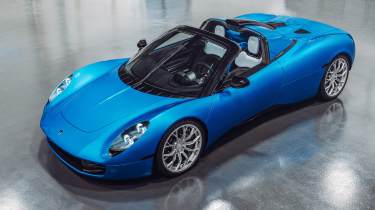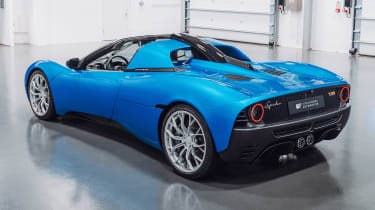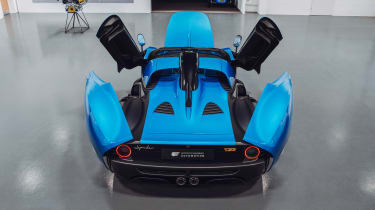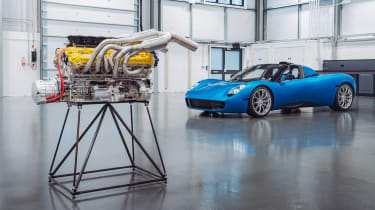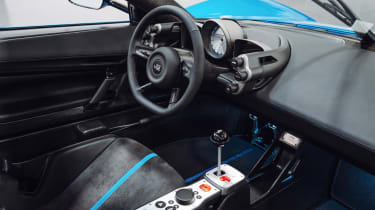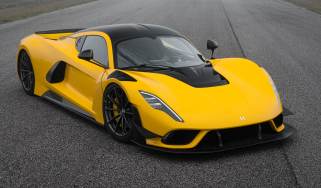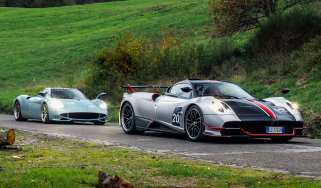New GMA T.33 Spider: a deep dive into Gordon Murray's V12 roadster
The second family member of the T.33 lineup arrives with a bespoke open-roof design and a stunning naturally-aspirated V12
The arrival of the GMA T.33 Spider should come as no surprise. Gordon Murray and his team have been nothing but open when it comes to his company’s product strategy. ‘We always said there’d be three T.33 models: the coupe, an open car and a performance model,’ says Murray. ‘The Spider is the second of the trio.’ It is also, to these eyes at least, the prettiest of the GMA cars to date.
Since the 2019 reveal of the headline-grabbing three-seater fan-assisted T.50 halo model, Murray, CEO Phil Lee and the team they have assembled around them – ‘Some think we’re a start-up, but we have a number of people who have been working with me for more than 20 years,’ says Murray – have not only neared completion of that car’s development, with the last pre-production prototypes exiting the production hall as the rst customer car entered it last month, but have continued development of the two-seater T.33 models, too.
As with all GMA cars, only 100 of each model will be produced, with the Spider set to follow the coupe production run and come ahead of the T.33 S performance model that’s due in 2024. ‘We’re not decided if the S should be a coupe or Spider yet,’ says Murray. ‘It’s the beauty of being small and agile; we don’t have layers of management slowing the decision process.’ And, as with the coupe, the Spider is a global car, with GMA spending north of an additional £20 million just to put it through Federal testing to meet US legislation.
It’s this streamlined operational approach that allows GMA to flourish, the team of designers and engineers working side by side, all with direct access to the man whose name is above the door and who demands that complacency is left outside it. In an automotive world full of complexity and processes, it’s an approach that allows creativity to become reality without compromise.
Murray drops in that he’s considering establishing a Special Projects department to allow even more bespoke ideas and projects. Even as he approaches his 77th birthday, Gordon Murray retains an enthusiasm and passion, both for cars and the industry – qualities that you’re unlikely to encounter in the majority of manufacturer boardrooms, with those at the top desperate to demonstrate their business credentials rather than demonstrating that they understand the business they are in.
Everything created within GMA for the T.33 Spider – and the company’s other models – is done so for an express purpose and to the highest possible standard. Granted, the no-compromise approach to material use and construction is easier to follow when your product pricing is in seven figures, but it still requires the craft to capitalise on their potential and utilise them accordingly. It’s why Murray has no interest in chasing performance and power figures for his cars, preferring instead to chase weight out of them and be as efficient as possible in every area of their creation.
‘Light weight is crucial to everything we do, but so is packaging and the car’s footprint,’ he explains. ‘Poor packaging consumes more space, which requires larger areas for engines, gearboxes, HVAC systems... And if you give someone an area to fill they will fill it, so whatever it is they are working on, whether consciously or subconsciously, it increases in size and weight to fill the available space. It’s so inefficient and unnecessary. It creates cars that are not only too heavy but too big for our roads.’ One criticism that certainly can’t be directed at the T.33 Spider.
Design
This is not a T.33 coupe with the roof removed. There’s a coupe in the same viewing area that the Spider is presented in and, while the GMA design DNA is evident, the transformation from fixed-head coupe to targa-style roadster is striking. Murray’s appreciation of 1960s sportscars is clear, with hints of iconic models from the era, predominantly Italian, creating a design of clear purity. It looks delicate; light obviously, and as an object one that demands your attention. I can’t help but see Ferrari’s 250 LM in certain angles – which is no bad thing – with the Spider’s smooth, uncluttered frontal area, long rear deck and cut-off tail redolent of the ’60s endurance racing classic.
‘Initially we designed the buttresses to follow the flow of the coupe’s,’ says Murray, ‘but without the coupe’s angled engine cover they looked too long, the car too close to the coupe’s overall appearance. It didn’t look right. By shortening them we’ve been able to give the Spider its own identity that has no negative impact on the car’s aerodynamic performance.’ In creating the rear deck, a new solution was required for exhaust and engine cooling too, resulting in two pairs of chimney stacks for the engine and exhaust system positioned on the deck, with additional engine cooling achieved by a discreet opening around the V12’s snorkel-like air inlet.
A change to the angle and positioning of the windscreen header rail will be made before testing begins to aid ingress and egress and also forward visibility. Every body panel from the front wheel centre-line back is new, including a redesign of the hinged luggage panniers that are concealed between the rear of the door and ahead of the rear wheel. Transforming the T.33 into a Spider are two removable carbon-composite roof panels — the entire body is made from the same material — which are stored in the front luggage compartment.
The rear window behind the passenger compartment can also be opened, sliding into the body structure between the passenger cell and engine bulkhead. At just 1135mm high, the T.33 Spider sits lower than an Alpine A110, a McLaren Artura and anything else in series production. It’s only six centimetres wider than the French sports car, too, and a few millimetres longer than Porsche’s Boxster. As an exercise in packaging, it’s unrivalled.
Chassis
GMA’s iStream Ultralight carbonfibre monocoque structure underpins the Spider, as it does the T.33 coupe. With the Spider’s requirements in terms of stiffness and rigidity leading the tub’s design for both models, the Spider’s overall weight increase over the coupe is a mere 18kg (GMA provides a claimed dry weight of 1108kg for its latest model). There’s no additional bracing required for the open car, only some small changes to the construction of the carbon panels that are formed around the aluminium tubular structure.
The suspension retains double wishbones at each corner and forgoes active dampers. ‘They add unnecessary weight and complexity, and if you have the stiffness in the chassis you can calibrate the spring and damper rates, and bump and rebound, to meticulous levels to deliver the ideal ride and handling balance,’ explains Murray, who takes ride and handling characteristics as seriously as he does weight-saving.
With the rear suspension mounted directly to the transmission casing, GMA uses its flexible Inclined Axis Shear Mounting (IASM) to isolate vibration to the cabin without compromising the car’s dynamics. As with the coupe, the Spider features electro-hydraulic steering, is equipped with carbon-ceramic brakes and has 19 and 20-inch front and rear wheels respectively, fitted with off-the-shelf Michelin Pilot Sport 4 S rubber that the dynamics have been engineered around, rather than a bespoke tyre that often results in long lead-times when replacements are required.
Engine and transmission
GMA’s T.33 models might forgo the headline-grabbing ground-effect fan of the T.50, but the all-aluminium 4-litre Cosworth GMA V12 is very much in attendance and the numbers remain staggering: 607bhp at 10,250rpm, 333lb ft of torque at 6750rpm (with 75 per cent available from 2500rpm and 90 per cent maintained between 4500 and 10,500rpm) and a red line set at 11,100rpm; as with the T.33 coupe, that’s 1000rpm lower than in the T.50.
Fed through its ram-air effect intake that sits above the cockpit – how ear-splittingly astonishing is that going to sound with the roof off? – the engine itself weighs just 178kg, with the Xtrac-developed six-speed H-pattern manual gearbox the lightest of its kind at only 82kg. Compact, light and efficient, as a motive force for a pure driver’s supercar, we can’t think of anything more suitable than this powertrain; T.50 development cars with their more powerful 654bhp state of tune are returning high-20s/low-30s mpg in normal driving.
Meanwhile, Cosworth’s know-how and Murray’s fastidious attention to detail have resulted in an engine that’s as mesmerising to look at as it will be intoxicating to experience. Little wonder customers are asking for show engines to display alongside their cars and Gordon is working on a way to display the V12’s inner workings, which look as detailed and exquisitely beautiful as the world’s finest watch mechanisms.
Interior
The T.33 Spider’s lithe and light look is carried over inside, too. The carbonfibre is left unlaquered – and saved from being polished to within a micron of its life. Carbon is also used for the seats but they can be trimmed in leather and Alcantara, and the rear bulkhead is colour-coded to the exterior paint, for which four themes have been curated by the GMA design team, including one palette that acknowledges Murray’s penchant for a tropical shirt.
Exterior colours are then matched to interior hues, although at this price – £1.8 million, a figure GMA had little control over after seeing its costs increase by 40 per cent – you can of course have any colour you wish. Regardless of the colours chosen, the cockpit remains a functional place, with carbonfibre and solid pieces of aluminium billet machined to create the switchgear and controls. Wireless connectivity provides the entertainment if, for some reason, a naturally aspirated V12 doesn’t do it for you...
GMA T.33 Spider specs
|
Engine |
3.9-litre naturally-aspirated V12 |
|
Power |
608bhp @ 10,250rpm |
|
Torque |
333lb ft @ 6750rpm |
|
Weight |
1108kg (dry) |
|
Power-to-weight |
c549bhp/ton |
|
0-62mph |
TBC |
|
Top speed |
c200mph |
|
Price |
£1.8m |

